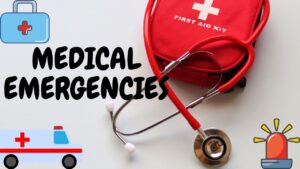Read time 4 minutes
This blog is another opportunity to feel grateful. Thank you, dear Universe, you continue to bless me with recovery and health.
Caffeine alertness is required, especially when someone in the family suffers a rare or chronic disease. The unpredictable nature of medical emergencies and their impact can be severe.
In such situations, it is important to have muscle flexibility in emergency preparedness. It is key to be prepared and proactive.

The Unpredictability of Medical Emergencies
Each of us is exposed to various health hazards. There are many moments of ambiguity. Medical emergencies are nearly inevitable and often strike without prior warning.
I understood the meaning of it during the process of my diagnosis.
In 2016, I was diagnosed with a rare disease called Isaacs’ Syndrome. Isaacs’ is a neuromuscular health condition that stems from muscle hyperactivity. In the process, I also discovered that I had Lyme disease. Lyme is a bacterial illness that gets transmitted through ticks.
Glaucoma also accompanied me. Glaucoma is an eye-related disease that damages the optic nerves. And Membranous Glomerulonephritis is a progressive kidney disease. I faced tremendous issues with my gut, stomach acid, and digestive enzymes. During my journey, I also developed Irritable Bowel Syndrome (IBS), Diabetes, Frozen Shoulder, Eczema and Blood Pressure.
You might guess that these diagnoses altered the course of my life. Many rare and chronic diseases characterize day-to-day unpredictable situations and symptoms. It led to a heightened sense of uncertainty for me. I was confined to bed with props and prescribed medicines. The situation made me vulnerable to creating further complications to my neurological condition.
I also felt overwhelmed by the waves of difficult emotions. The emotional upheaval made it even more difficult to function straight. My body suffered alien symptoms.
The sudden list of diverse symptoms and moods made it even more challenging to cope.
The in-house medicine box
As my symptoms rendered me quite vulnerable to a host of common illnesses, we kept a box stocked with essential medicines. The nearest medical shop is almost 5 km from where I lived also made this practice necessary. Some general precautions apply, such as ensuring the medicines are not consumed past their expiry date or storing them in conditions ideal for preserving their therapeutic value and being safe from weather conditions.
Emergency contact information
In my family’s case, the list of emergency contact information included an ambulance, a junior doctor, and other medical staff who were available round the clock on all days to forestall any medical emergency even late at night.
An emergency contact information can be a lifesaver in case of a medical emergency. In an emergency even a person with the best of memories may fumble or miss on the important information relevant to that situation therefore it’s advisable to have their names along with phone numbers handy during such situations. An elderly couple residing in Delhi has a white board in their room mentions some of the important contacts that can be used in those ‘just in case’ situations.
Useful Home Remedies
Though many of us might respond to an emergency with hysteria however nothing matches, keeping a cool head. We kept a list of useful kitchen remedies readily available as I was prone to a sudden drop in blood glucose or blood pressure levels, and to fevers and colds. We also used ORS often to overcome dehydration and supplement blood glucose levels.
My family doctor was always kept in the loop
My family doctor was our trusted confidant and knew my medical history, which made getting immediate relief much easier during my hospitalizations. Having someone who can act as a backup for your family doctor is also useful.
Health Records Management
I always kept all my medical records updated and properly filed for easier access in times of need. Putting in place proper recordkeeping tools made my entire care system from diagnosis and control to recovery more effective.
Keeping Insurance coverage in check
Although insurance coverage cannot protect a patient from getting diagnosed with a rare disease, its role in reducing financial uncertainty is undeniable. I made sure to carry my insurance details during my hospitalizations to simplify paying the bills, as getting treated for a rare disease had a steep impact on our pockets. Crucially, my insurance policy covered many pre- and post-hospitalization expenses and came with AYUSH benefits that helped pay for my Ayurvedic treatments as well. Not all insurance policies are as generous, so it is important to study and understand fully the policy’s details, coverage offered, and eligibility conditions.
My key takeaway
A rare disease patient’s world is full of surprises and therefore preparing for medical emergencies is essential to cope with unanticipated experiences. It took my family a couple of episodes to become familiar with my health requirements and deal with my situation competently using available resources and appropriate medications.
We were able to connect as a family and understand the demands of my condition more thoroughly, which enabled us to prepare and plan better.
In a nutshell, being prepared and proactive can save lives during medical emergencies.
DISCLAIMER
The views expressed in this article are the author’s own and do not represent any kind of medical advice.


